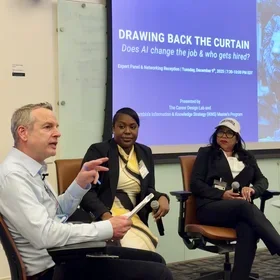Columbia University’s M.S. in Applied Analytics Lecturer Diahanna Post recently won the prestigious 2022 Arthur C. Nielsen Award, given by the global marketing research firm Nielsen Corporation annually to a team of employees. Post and her team were recognized for their work recuperating television and streaming channels to a pre-pandemic model, while reshaping strategies for the future. As Vice President of Operations Transformation at Nielsen, Post offers insightful advice to new graduates on the importance of implementing the latest and most comprehensive strategies to continue to reach wide audiences. In the Q&A below, Post provides insightful details on the Arthur C. Nielsen Award, as well as further details about her work at Nielsen.
What is the Arthur C. Nielsen award?
The Arthur C. Nielsen Award is named in honor of Nielsen’s founder. It is historically the most coveted and highest profile recognition a Nielsen employee can receive. I received the award as part of a larger team effort in recognition of exceptional outcomes and leadership for the tremendous progress toward both recovering our television and streaming measurement panel and the long-term transformation of our panel.
Why does the Arthur C. Nielsen Award focus on fostering “inclusion, courage and growth,” and how did you and your team meet these goals?
Nielsen’s values are inclusion, courage and growth. Our team exhibited these values as we executed a bold effort to return our television and streaming measurement panel to its pre-COVID-19 size, which was around 41,000 households. We also increased our ability to measure devices that stream content in addition to traditional linear television. My group’s part in this work related to building descriptive and predictive analytics to help inform our field teams, who were out visiting homes around the U.S. to recruit and install households with Nielsen’s TV measurement.
While recent graduates need to learn the business and the data, and respect what the more seasoned employees know, we often lean on the newer hires for some of the new skills they bring.
Why is it important for students interested in analytics to adapt to new strategies and move away from “legacy mindsets”?
Students who are interested in analytics must bring a growth mindset to the field. Even if you are just graduating now, the field is changing incredibly rapidly, and new tools and techniques will come up in the next few years. You need to learn quickly and adapt. I think it is even more important for recent graduates to demonstrate this skill of adaptability, as they will be entering workplaces with people who have sometimes worked there for decades, and may need some help changing their legacy mindset. So while the recent graduates need to learn the business and the data, and respect what the more seasoned employees know, we often lean on the newer hires for some of the new skills they bring.
What are you most excited about in the field of analytics?
In the field of applied analytics, I am most excited about the opportunity to bring change to companies that have been around for a while, where some of the people may have a legacy mindset. It is so powerful to show those who are skeptical of all the change, that analytics really can bring benefits–machine learning is not just a buzzword, but in fact can provide real value if done with an understanding of the data and the business.
What is your advice to students interested in leadership roles?
My advice to students who are interested in leadership roles is first and foremost to excel at their current jobs. Too often, I see people who say they want to be in leadership but they are not willing to do the hard work of showing that they can excel in their current roles. So I really emphasize that as step one. Then, in the context of the job you have, you can demonstrate leadership by raising your hand for new responsibilities, asking thoughtful questions to help move the discussion forward in meetings, and asking your boss how you can help them.



